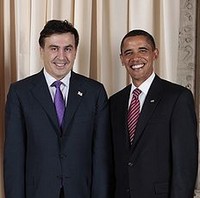An important challenge for U.S. diplomacy during the upcoming NATO summit is to ensure that the lack of a decision to enlarge NATO does not become a defining outcome of the gathering. Most NATO summits do not invite new members. Indeed, there have been only three enlargement summits since 1989. But even at summits where new members were not invited to join, NATO leaders have emphasized that the alliance maintains an “open door” to new members, and the Chicago summit should be no exception in this regard.
Perhaps nowhere is this more relevant than in the case of Georgia, which began actively seeking to join the alliance in 2005. Since then, Tbilisi has made significant progress in strengthening its credentials for NATO membership, which polls show is overwhelmingly supported by the Georgian population. At the 2008 NATO summit in Bucharest, in ruling out a Membership Action Plan for Georgia, the alliance assured Tbilisi that it will eventually become a NATO member, defining the issue as a question of when, not if. In addition to reaffirming this decision, the Chicago summit should recognize the progress Georgia has achieved toward meeting membership criteria, clarify Georgia’s path to further integration with NATO and take steps to advance the integration process.
In an interview earlier this year with World Politics Review, Temur Yakobashvili, Georgia's ambassador to the United States, explained that his government would still like a Membership Action Plan (MAP), but that Tbilisi does not consider a MAP to be the sole path toward NATO membership. The alliance could also declare that the existing membership mechanisms that Georgia possesses, such as the NATO-Georgia Commission and Annual National Plan, are sufficient and will ultimately lead to Georgian membership in NATO.

